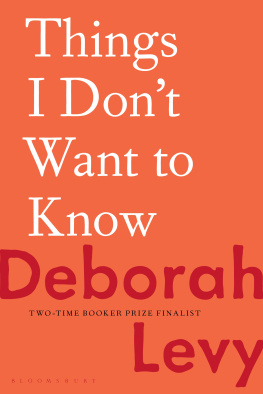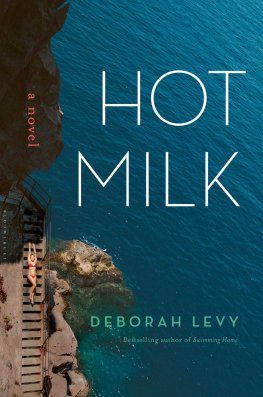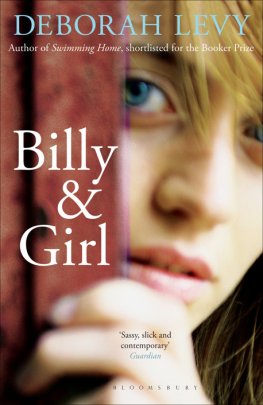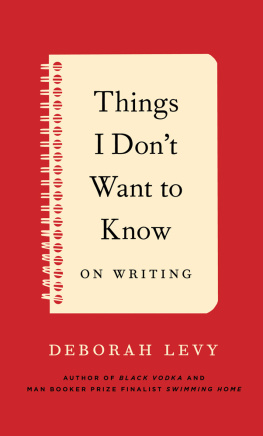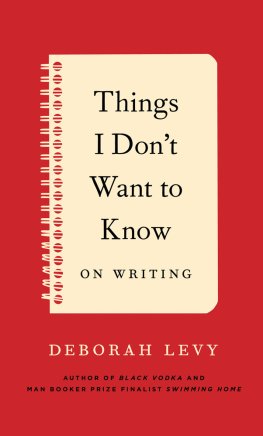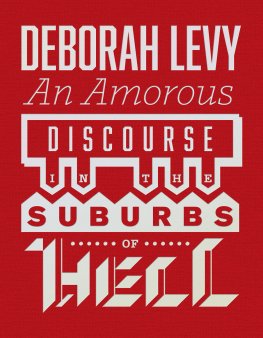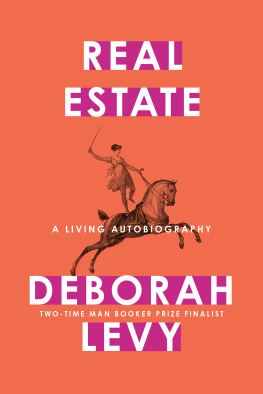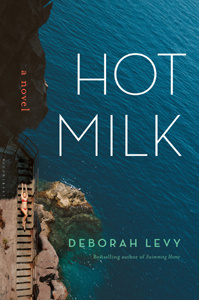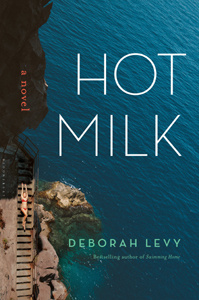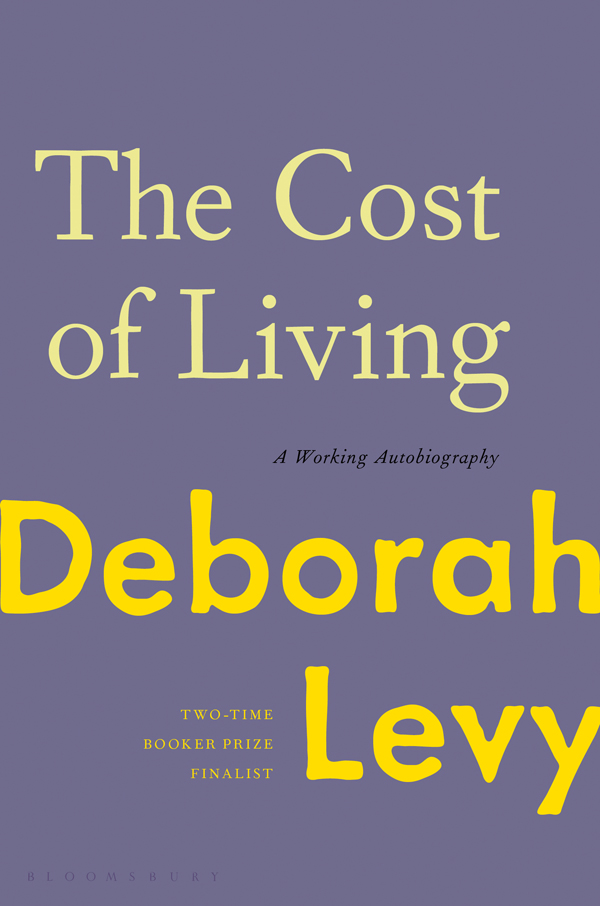Contents
Guide
Pagebreaks of the print version


BY THE SAME AUTHOR
Ophelia and the Great Idea
Beautiful Mutants
Swallowing Geography
The Unloved
Diary of a Steak
Billy & Girl
Pillow Talk in Europe and Other Places
Swimming Home
Black Vodka
Things I Dont Want to Know
Hot Milk


CONTENTS
Youre always more unreal to yourself than other people are.
Marguerite Duras, Practicalities (1990)
As Orson Welles told us, if we want a happy ending, it depends on where we stop the story. One January night I was eating coconut rice and fish in a bar on Colombias Caribbean coast. A tanned, tattooed American man sat at the table next to me. He was in his late forties, big muscled arms, his silver hair pinned into a bun. He was talking to a young English woman, perhaps nineteen years old, who had been sitting on her own reading a book, but after some ambivalence had taken up his invitation to join him. At first he did all the talking. After a while she interrupted him.
Her conversation was interesting, intense and strange. She was telling him about scuba-diving in Mexico, how she had been underwater for twenty minutes and then surfaced to find there was a storm. The sea had become a whirlpool and she had been anxious about making it back to the boat. Although her story was about surfacing from a dive to discover the weather had changed, it was also about some sort of undisclosed hurt. She gave him a few clues about that (there was someone on the boat who she thought should have come to save her) and then she glanced at him to check if he knew that she was talking about the storm in a disguised way. He was not that interested and managed to move his knees in a way that jolted the table so that her book fell to the floor.
He said, You talk a lot dont you?
She thought about this, her fingers combing out the ends of her hair while she watched two teenage boys selling cigars and football shirts to tourists in the cobbled square. It was not that easy to convey to him, a man much older than she was, that the world was her world too. He had taken a risk when he invited her to join him at his table. After all, she came with a whole life and libido of her own. It had not occurred to him that she might not consider herself to be the minor character and him the major character. In this sense, she had unsettled a boundary, collapsed a social hierarchy, broken with the usual rituals.
She asked him what it was that he was scooping up from his bowl with tortilla chips. He told her it was ceviche, raw fish marinated in lime juice, which was written in the menu in English as sexvice It comes with a condom, he said. When she smiled, I knew she was making a bid to be someone braver than she felt, someone who could travel freely on her own, read a book and sip a beer alone in a bar at night, someone who could risk an impossibly complicated conversation with a stranger. She took up his offer to taste his ceviche, then dodged his offer to join him for a night swim in an isolated part of the local beach, which, he assured her, was away from the rocks.
After a while, he said, I dont like scuba-diving. If I had to go down deep, it would be for gold.
Oh, she said. Its funny you say that. I was thinking my name for you would be the Big Silver.
Why Big Silver?
It was the name of the diving boat.
He shook his head, baffled, and moved his gaze from her breasts to the neon sign for Exit on the door. She smiled again, but she didnt mean it. I think she knew she had to calm the turbulence she had brought with her from Mexico to Colombia. She decided to take back her words.
No, Big Silver because of your hair and the stud above your eyebrow.
Im just a drifter, he said. I drift about.
She paid her bill and asked him to pick up the book he had jolted to the floor, which meant he had to bend down and reach under the table, dragging it towards him with his foot. It took a while, and when he surfaced with the book in his hand, she was neither grateful nor discourteous. She just said, Thanks.
While the waitress collected plates heaped with crab claws and fish bones, I was reminded of the Oscar Wilde quote Be yourself; everyone else is already taken. That was not quite true for her. She had to make a bid for a self that possessed freedoms the Big Silver took for granted after all he had no trouble being himself.
You talk a lot dont you?
To speak our life as we feel it is a freedom we mostly choose not to take, but it seemed to me that the words she wanted to say were lively inside her, mysterious to herself as much as anyone else.
Later, when I was writing on my hotel balcony, I thought about how she had invited the drifting Big Silver to read between the lines of her undisclosed hurt. She could have stopped the story by describing the wonder of all she had seen in the deep calm sea before the storm. That would have been a happy ending, but she did not stop there. She was asking him (and herself) a question: Do you think I was abandoned by that person on the boat? The Big Silver was the wrong reader for her story, but I thought on balance that she might be the right reader for mine.
Everything was calm. The sun was shining. I was swimming in the deep. And then, when I surfaced twenty years later, I discovered there was a storm, a whirlpool, a blasting gale lifting the waves over my head. At first I wasnt sure Id make it back to the boat and then I realized I didnt want to make it back to the boat. Chaos is supposed to be what we most fear but I have come to believe it might be what we most want. If we dont believe in the future we are planning, the house we are mortgaged to, the person who sleeps by our side, it is possible that a tempest (long lurking in the clouds) might bring us closer to how we want to be in the world.
Life falls apart. We try to get a grip and hold it together. And then we realize we dont want to hold it together.
When I was around fifty and my life was supposed to be slowing down, becoming more stable and predictable, life became faster, unstable, unpredictable. My marriage was the boat and I knew that if I swam back to it, I would drown. It is also the ghost that will always haunt my life. I will never stop grieving for my long-held wish for enduring love that does not reduce its major players to something less than they are. I am not sure I have often witnessed love that achieves all of these things, so perhaps this ideal is fated to be a phantom. What sort of questions does this phantom ask of me? It asks political questions for sure, but it is not a politician.
When I was travelling in Brazil, I saw a brightly coloured caterpillar as thick as my thumb. It looked as if it had been designed by Mondrian, its body marked with symmetrical squares of blue, red and yellow. I couldnt believe my eyes. Most peculiar of all, it appeared to have two vibrant red heads, one on either end of its body. I stared at it over and over again to check if this could possibly be true. Perhaps the sun had gone to my head, or I was hallucinating from the smoky black tea that I sipped every day while I watched children play soccer in the square. It was possible, as I discovered later, that the caterpillar presented a false head to protect itself from predators. At this time, I could not decide which part of the bed I wished to sleep on. Lets say the pillow on my bed faced south; sometimes I slept there and then I changed the pillow so it faced north and slept there too. In the end I placed a pillow on each end of the bed. Perhaps this was a physical expression of being a divided self, of not thinking straight, of being in two minds about something.

